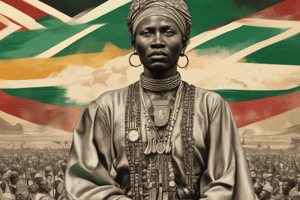Podcast
Questions and Answers
What significant event in 1957 marked the start of independence in Africa?
What significant event in 1957 marked the start of independence in Africa?
Ghana became the first colony to gain independence.
Which countries remained colonies in Africa until the 1970s or 1980s? (Select all that apply)
Which countries remained colonies in Africa until the 1970s or 1980s? (Select all that apply)
- Mozambique (correct)
- Namibia (correct)
- Ghana
- Nigeria
- Zimbabwe (correct)
The leaders of the nationalist movements had differing views on forms of government and economics.
The leaders of the nationalist movements had differing views on forms of government and economics.
True (A)
What was the 'Scramble for Africa'?
What was the 'Scramble for Africa'?
The year the Berlin Conference took place was ________.
The year the Berlin Conference took place was ________.
Which of the following nations did not gain independence in the 1950s?
Which of the following nations did not gain independence in the 1950s?
Colonial states aimed to unify African societies through their practices.
Colonial states aimed to unify African societies through their practices.
Study Notes
Africa Before Independence
- Most of Africa was under colonial rule by European empires in the first half of the 20th century.
- The scramble for Africa in the 1880s saw rapid colonial partition.
- The Berlin Conference of 1884-1885 resulted in a European agreement on how to divide African territories for imperial expansion.
- Colonial borders were often arbitrary, disregarding existing geographical, cultural, and historical divisions in Africa.
- Homogeneous groups were divided, unrelated groups were combined, and new groups were created.
- By 1885, around 10,000 African polities had been consolidated into 40 European colonies and protectorates.
- Colonial powers emphasized differences between groups and suppressed shared identities, a tactic known as "divide and rule" to maintain control.
Independence Movement
- African nationalism gained momentum after World War II, pushing for decolonization.
- Several African nations achieved independence starting in the 1950s:
- 1951: Libya (formerly under British and Italian control) gained independence.
- 1956: Sudan (British) gained independence.
- 1956: Tunisia (French) gained independence.
- 1956: Morocco (French and Spanish) gained independence.
- 1957: Ghana (formerly known as the Gold Coast, British) gained independence.
- By the 1960s, most African nations had gained independence.
- A few territories remained under colonial rule until the 1970s and 1980s, including:
- Mozambique
- Angola
- Zimbabwe
- Namibia
- Leaders of nationalist movements held high hopes for their newly independent nations, believing that freedom from colonial control would bring a brighter future.
- New African governments, led by Africans, expected to make decisions for their nations free from foreign interference.
- These leaders had varying views on government structures, political ideologies, and economic policies, which led to different approaches to nation-building and development.
Studying That Suits You
Use AI to generate personalized quizzes and flashcards to suit your learning preferences.
Related Documents
Description
Explore Africa's colonial history leading up to independence. This quiz covers the impact of European powers on African territories, the scramble for Africa, and the rise of nationalism post-World War II. Test your knowledge on the key events and concepts that shaped modern Africa.




